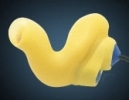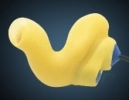
All's Quiet for EPA Hearing Rule
Only a few comments have been submitted to the online rulemaking docket, most of them manufacturers' requests to present during the Oct. 7 public hearing in Washington, D.C. The cost of testing custom molded ear plugs is a concern.
- By Jerry Laws
- Oct 01, 2009
EPA's Washington, D.C., headquarters will be the site for the Oct. 7 public hearing on the EPA hearing protector labeling and testing proposed rule, which will bring major changes to a regulation in place for 30 years. The online rulemaking docket has been quiet, possibly indicating there is no major unhappiness with the rule. Several manufacturers of hearing protection devices (HPDs) have submitted requests to make presentations at the hearing, however.
The deadline to submit comments about the rule is Nov. 4.
Four substantive comments had been submitted at press time. Three urge EPA to reconsider the sample size that would be required for testing custom molded ear plugs, and a fourth sent by the Acoustical Society of America's standards director, Paul D. Schomer, Ph.D., alerts EPA that its proposed rule references a standard -- ANSI S12.42-1995 -- that is being revised. The Accredited Standards Committee S12, Noise, balloted the ANSI/ASA S12.42-200x standards and accepted public comments until Sept. 21, Schomer said.
Changes Sought for Custom Molded Plugs
The comments about custom molded ear plugs say the proposed test sample of 20 units is too costly for the small manufacturers specializing in these products. Kurt Yankaskas of the U.S. Navy's Office of Haval Research said in his comment that the Navy is working to reduce hearing loss in its ranks and has focused on custom molded plugs that allow communications, dosimetry, and active noise reduction.
 "The addition of such complex, miniaturized electronics dramatically increases the cost of these earplug systems to as much as $2,000.00/pair," Yankaskas wrote. "At these costs, the proposed test sample of 20 units for custom molded earplugs creates an excessively onerous expense for the small companies the Navy is working with to solve a very substantial problem. Since testing would be performed with preproduction units, before the economies of mass production (and the associated cash flow) would become significant, this issue could be even more exaggerated."
"The addition of such complex, miniaturized electronics dramatically increases the cost of these earplug systems to as much as $2,000.00/pair," Yankaskas wrote. "At these costs, the proposed test sample of 20 units for custom molded earplugs creates an excessively onerous expense for the small companies the Navy is working with to solve a very substantial problem. Since testing would be performed with preproduction units, before the economies of mass production (and the associated cash flow) would become significant, this issue could be even more exaggerated."
He said a test sample size of only two to four units "would leave the market open to smaller vendors and ultimately improve the products available to our personnel through competition. The net result would be a better protected workforce."
Jason M. Dunn, president of Hearing Armor, LLC, also recommended lowering the requirement to test 20 subjects fitted with custom molded ear plugs. He said five test subjects are sufficient if the manufacturers meet these conditions:
- The device incorporates attenuating technology that has been tested in a "universal fit" plug in accordance with the regulations;
- If the technology's manufacturer isn't also the producer of the plug, the manufacturer has given the producer results of tests it conducted pursuant to the regulations and the required labels;
- The producer of the custom molded plug performs the tests using 10 subjects;
- Results of the tests performed with the five subjects are "reasonably similar" to the results of tests performed on the "universal fit" plug containing the attenuation technology; and
- The custom molded HPD is labeled pursuant to the regulations using data from the tests of the five subjects, not with the data from the "universal fit" plug containing the attenuation technology.
Estimated Costs of Product Testing
The rule requires two types of product testing: effectiveness testing of existing products, which EPA estimates will cost between $7 million and 415 million nationwide, and recurrent testing, estimated by EPA to cost between $607,000 and $1.2 million per year nationwide if recurrent testing were required every five years, more if required at three-year intervals. Relabelers -- companies that brand HPDs but do not manufacture them -- would incur costs, as well. But EPA says all of these costs combined amount to less than 1 percent of total industrial HPD sales.
In its rule, EPA said manufacturers expect the cost of developing new product labels would be $5,000 to 410,000 per HPD device, although one manufacturer estimated the cost would be $25,000 to $48,000. The new test methods proposed in the rule would cost $2,000 to $10,000 per model, versus the $1,700 to $4,000 per model cost of current testing methods, according to the rule.
About the Author
Jerry Laws is Editor of Occupational Health & Safety magazine, which is owned by 1105 Media Inc.